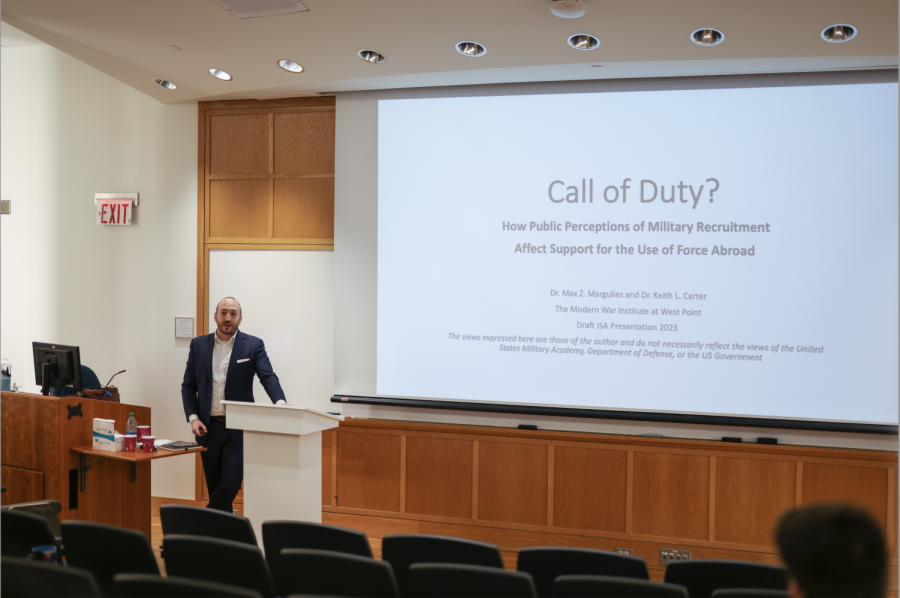International Relations Department Sponsors Lecture on Public Opinion of U.S. Military Service
Max Marguiles — director of research and assistant professor at the Modern War Institute at West Point — visited Colgate University on Wednesday, Feb. 22, to deliver a lecture on the public’s perception of the United States military and military recruitment. The lecture, titled “Call of Duty? How Public Perceptions of Military Recruitment Affect Support for the Use of Force Abroad,” was sponsored by the Kulla Lecture Family Fund and the Department of International Relations’ “IR and Foreign Policy Lecture Series.”
“[The year] 2023 marks the 50th anniversary of the creation of the All-Volunteer Force,” Margulies said. “This force was created in place of the United States draft after the occurrence of the Vietnam War and national controversy and protest held by many Americans towards the draft in the 1960s.”
In his lecture, Margulies described how after the controversy of the Vietnam War, the United States military decided to end the use of a draft and instead opt for a volunteer system. Today, the US military is composed solely of volunteers who choose to serve the country. Marguiles explained how this has affected many Americans’ perception of the United States military and its involvement in other countries.
“Today, a smaller segment is connected to the army than ever from the American public,” Margulies said. “This means that [fewer] people are connected to wars than ever before, which explains why according to data we have gathered over the past two decades, why the American public opinion to wars has been less negative than in years prior. It’s simply because [fewer] people care.”
Marguiles discussed how the decrease in military recruitment makes sense given the now all-volunteer service. Under a draft army, most male Americans had no choice but to enlist in the military during times of war. Today, with the all-volunteer service, Marguiles noted that it is primarily Americans who have a desire to serve who enroll. In 1968, at the peak of the Vietnam War and military draft recruitment, there were over three million Americans in the military. Now, over fifty years later, there are only slightly over a million Americans in today’s all-volunteer force.
This significant drop came as a shock to some in attendance at the lecture, including sophomore Jackson Moran.
“I had no idea that military recruitment had dropped by over half,” Moran said. “That number definitely came as a surprise to me.”
According to Marguiles, a large proportion of Americans’ divisive opinions about past military participation appeared to stem from the United States military draft, which created a connection between many American families and the military. Without this draft, he theorized that there is less of a connection between the military and many Americans.
“If you live under a draft army, more people are exposed to the war and actively going to war,” Margulies said. “This leads to a huge disruption in family planning, and creates a massive upset to many Americans who are told they have no choice but to go to war.”
Marguiles explained that there is now less controversy when members of the armed forces going abroad to war because they have volunteered to do so. Today, numerous Americans do not have a strong opinion towards the military compared to the past, regardless of whether these past feelings were positive or negative, according to Marguiles.
The lecture was organized by Harvey Picker Professor of International Relations, Fred Chernoff, who encouraged all students to attend lectures similar to Margulies’, regardless of how much they know about the topic.
“I absolutely encourage every Colgate student to attend lectures hosted by the University,” Chernoff said. “If you don’t know anything about the lecture topic beforehand, then you’re definitely going to learn a lot by attending.”







